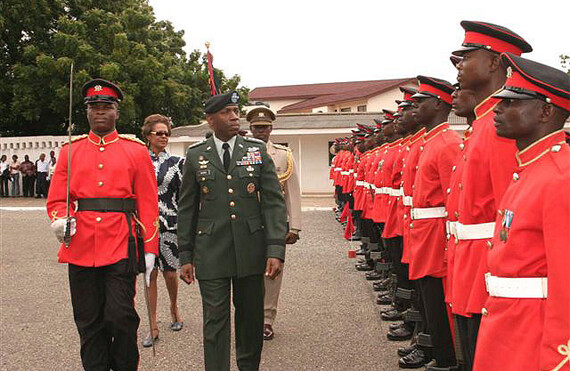It could be auspicious timing or a bad omen that Somali pirates hijacked a Ukrainian arms shipment the day before the U.S. military launched its new African Command. AFRICOM addresses a long-standing gap in the U.S. command structure, but there are concerns that the project has strayed from the interagency approach at the core of its mission.
Prior to the announcement of the new command in February 2007, responsibility for Africa was divided between Central, Pacific, and European commands, relegating Africa policy to secondary status. The creation of AFRICOM reflects the increasing strategic relevance of Africa, where the United States is vigilant for nascent terrorist havens and sensitive to increased Chinese influence over the continent's vital energy and resources.
AFRICOM's primary goal is to help African nations handle the continent's problems without outside intervention, with the oft-stated goal of keeping American troops out of Africa for the next fifty years. Described by one reservist as "Peace Corps with a weapon," AFRICOM was billed as a post–Cold War experiment combining diplomacy, development, and defense. This "3D" approach is supposed to integrate the efforts of the State Department, the U.S. Agency for International Development, and the Defense Department, among other agencies.
The proper balance between these partners has yet to be found. The project is at the beginning of what promises to be a long process, but the eventual character of AFRICOM will have far-reaching consequences for the U.S. approach to Africa and the rest of the developing world.
The Pentagon's newfound attention to Africa has been greeted with skepticism, both at home and in Africa, as the search for a country willing to host AFRICOM headquarters dominated initial discussions. Given the sheer size of Africa and the operational value of having personnel on the continent, a headquarters in Africa would have been preferable, but the legacy of colonialism and a lackluster public diplomacy campaign hampered the search process. As a result, the command will be based in Germany for the foreseeable future.
AFRICOM is intended to model changes within the U.S. military called for by Thomas Barnett and others, incorporating lessons learned in Iraq and Afghanistan and embracing the notion of a "whole-of-government" approach. The new emphasis is on "Phase Zero"—operations that are designed to prevent violent conflicts through the coordination of humanitarian, public diplomacy, and capacity-building efforts. The priority placed on such interagency efforts was evident in the appointment of a State Department deputy for civil-military affairs, to coordinate with AFRICOM Commander William Ward.
While hopeful pledges of cooperation surrounded the earliest stages of the AFRICOM effort, the dialogue between agencies has deteriorated into what one official describes as a juvenile standoff. A GAO report released in July found that while the Department of Defense had made progress staffing the military personnel for AFRICOM, it expected to have only half of the civilian positions and a quarter of the interagency positions filled by the time the command became operational. The Pentagon attributed this imbalance to limited resources and personnel at the other agencies, but the GAO noted that DOD had continually de-emphasized interagency cooperation in its statements about AFRICOM.
Refugees International released a report in July highlighting the dangers of interagency imbalance by examining U.S. military performance in Liberia and Congo. The American NGO questioned whether contractors—mostly former soldiers from Western armies opting for higher salaries in the private sector—are able to instill the sense of national commitment and ethical service that constrains militaries in appropriate roles for society. The report called for a stronger focus on security sector reform and bilateral cooperation than is included in the current AFRICOM effort.
The House Appropriations Defense Subcommittee recently questioned the role that traditional military operations should play in the U.S. approach to Africa and encouraged the Pentagon to rethink the entirety of the project. The appropriations bill that the president signed earlier this month had $123 million cut from his request for AFRICOM, with the decrease attributed partly to the inability to site command headquarters on the continent. Lawmakers have requested that a report on AFRICOM's progress be produced by the State Department, USAID, and DOD collectively next year.
The tensions that have surfaced surrounding AFRICOM reflect a cultural divide between policy professionals and the military community—the actor most capable of turning some of their ideas into action. While the project will hopefully have a positive influence on peace in Africa, effective and accountable civil-military coordination has the potential to be AFRICOM's most lasting impact.
![]() This article is licensed under a Creative Commons License.
This article is licensed under a Creative Commons License.
Please read our usage policy.




